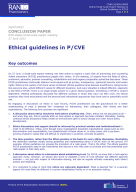Details
- Publication date
- 4 September 2023
- Author
- Directorate-General for Migration and Home Affairs
- RAN Publications Topic
- Training
Description
On 27 June, a small-scale expert meeting was held online to explore a topic that all preventing and countering violent extremism (P/CVE) practitioners grapple with: ethics. In this meeting, 10 experts from the fields of ethics, youthwork, education, prisoner counselling, rehabilitation and multi-agency cooperation joined the discussion. These P/CVE practitioners continually balance moral values such as privacy, transparency, (personal) security and human rights. Ethics is the system of all moral values combined.
Ethical questions arise because practitioners, being human like everyone else, uphold different values for different situations. And every situation is indeed different, especially in the field of P/CVE. There is no single simple answer to a given ethical question: everything in P/CVE is context dependent. Meeting participants discussed the different contexts in which they carry out their work, the ethical questions they have encountered and the personal and institutional approaches they have used or potentially would use.
By engaging in discussions on ethics in such forums, P/CVE practitioners lay the groundwork for a better understanding of what is deemed ‘fair’ treatment for themselves, their colleagues, their clients and their organisations.
The following five outcomes are significant.
- A discussion about ethics should be held before anything else. Often, ethics are not discussed at all — and when they are, this is typically after an intervention or approach has been initiated. Ultimately, holding continual ethics discussions helps create an environment open to social change and richer future policy development.
- Ethics discussions and support should be informed by practical wisdom and institutionalised in order to be effective. Today, even though many organisations broadcast organisational values such as nondiscrimination and accountability, the establishment of these values is, in many cases, still a top-down process of generic values that are difficult to implement in practical, concrete situations.
- The How question, rather than the What question is the basis for every ethics discussion, illustrating the distinction between simply having guidelines and implementing ethics in P/CVE work on the ground. For example, ethical guidelines can propose the promotion of a ‘safe space’. That is the What. The ethical question P/CVE practitioners need to ask themselves and discuss is how they plan to promote and instrumentalise such ‘safe spaces’ in their daily work.
- A discussion about ethics is a discussion about establishing trust. For P/CVE, we know that a multi-agency approach works. However, we should also strive to establish a level of trust between the different agencies involved — not just with respect to information-sharing, but also as regards ethically evaluating each other’s actions and reasoning.
- It is important to keep in mind that ethics are culturally dependent. What is deemed ‘fair’ in a security agency will most likely be different in a prison rehabilitation facility or in an education setting.

